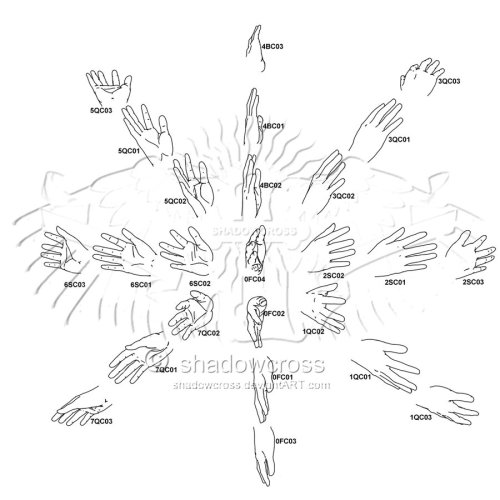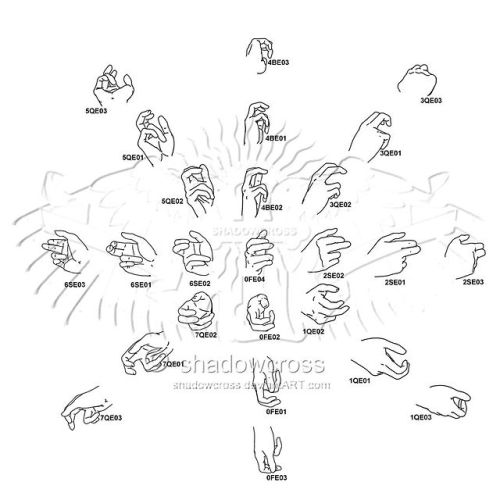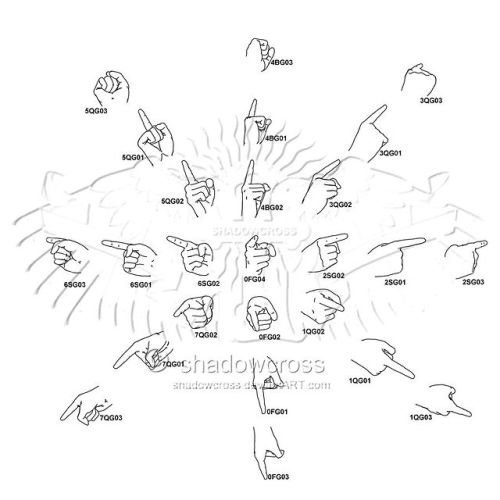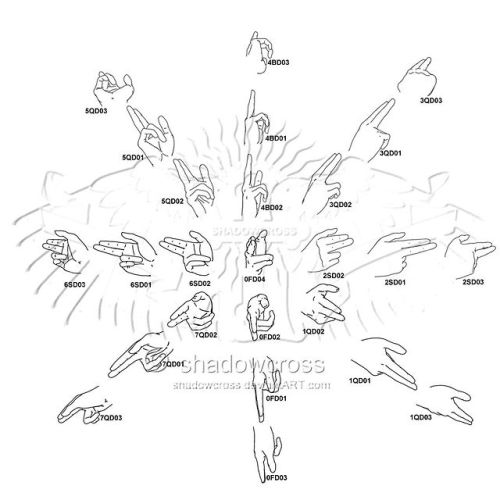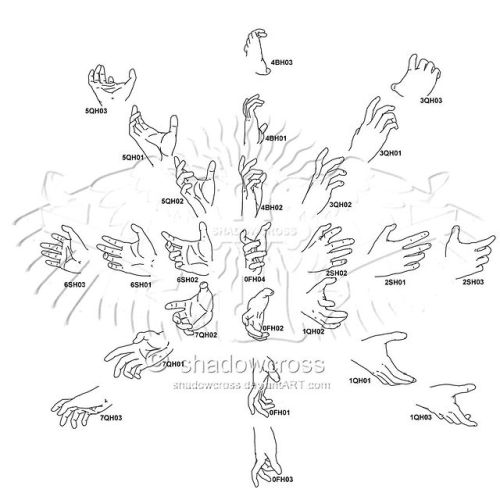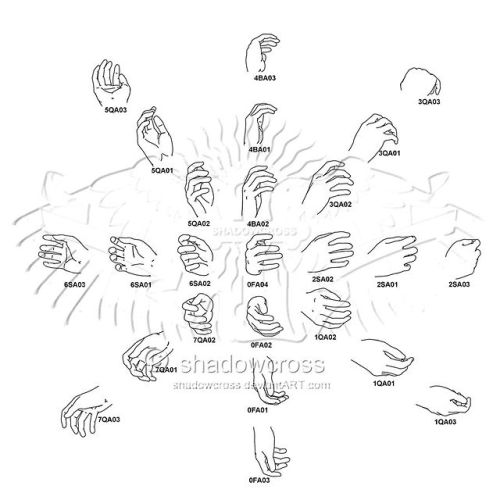Show, Don't Tell:
show, don't tell:
anticipation - bouncing legs - darting eyes - breathing deeply - useless / mindless tasks - eyes on the clock - checking and re-checking
frustration - grumbling - heavy footsteps - hot flush - narrowed eyes - pointing fingers - pacing / stomping
sadness - eyes filling up with tears - blinking quickly - hiccuped breaths - face turned away - red / burning cheeks - short sentences with gulps
happiness - smiling / cheeks hurting - animated - chest hurts from laughing - rapid movements - eye contact - quick speaking
boredom - complaining - sighing - grumbling - pacing - leg bouncing - picking at nails
fear - quick heartbeat - shaking / clammy hands - pinching self - tuck away - closing eyes - clenched hands
disappointment - no eye contact - hard swallow - clenched hands - tears, occasionally - mhm-hmm
tiredness - spacing out - eyes closing - nodding head absently - long sighs - no eye contact - grim smile
confidence - prolonged eye contact - appreciates instead of apologizing - active listening - shoulders back - micro reactions
More Posts from M3a7gr1nd3r and Others
Hey, you are not an embarrassment for not knowing how to do certain household chores/basic self-care. They do not come naturally to us. A lot of it takes practice! Maybe you had a neglectful guardian. Maybe you had one that was very coddling and never thought to teach you. Maybe you haven't lived in a place where these things were available to you or needed. Doesn't matter. It's okay to not know and far more common than you might realise.
That said, this website provides very simple instructions on how to do everyday tasks such as making your bed, using a washing machine, cooking different foods, washing dishes, taking a shower, etc. All you have to do is use the search bar to find the task you're struggling with, and it'll come up with what you need + other related how-to's:)
If you're having trouble navigating it, let me provide you with some examples:
How to clean dishes by hand
How to make your bed (with visual demonstrations of each step!)
How to fold clothes (with visual demonstrations of each step!)
How to take a shower & dry yourself off (also provides ways to shave beards, armpits, legs and genitals)
How to shave legs, armpits, beards, pubic areas, etc. (a more in-depth guide)
How to mop the floor
How to sweep the floor
How to swallow pills
How to make small talk
How to make eye contact in different situations (or how to avoid it while still looking natural)
It's also perfectly okay if these don't help or aren't appealing to you. Unfortunately, nothing helps everyone.
hi love !! so i want to start writing smut but i’m afraid it won’t be great or it will be cringe. do you have any ‘dos and don’t’ tips for writing smut??
it’s very much appreciated !
i don’t necessarily have any like ‘don’t write this’ or ‘only write this’ kind of dos and don’ts but here’s a few tips that may help!
don’t listen to the ‘i hate when writers use this word for that body part’ or etc, because you can’t please everyone. use the words that feel most comfortable and best for you. if people don’t like it they do not have to read it, or worse case they skip over the word and continue reading the fic. there’s only so many words to describe a dick!!!
and with the above said: don’t try to appease/please anyone but yourself. at the end of the day YOU are the writer, if you’re writing what does not feel right with you it’s going to show in your work and the words will not flow. if you want to write smut but only explain the feelings? go for it. if you want to write toe curling i need jesus smut using the word rod for dick? do it! write what feels right to you and ONLY you!
there are so many posts and masterlists on here on how to write smut for beginners and they have tons of tips, whether that may be reading others works to get the vibes and how scenes flow, or going on the hub and seeing how the mechanics work to help you put it into words. so i highly suggest utilizing those sources (a simple search on here or google will put you in the right direction)
but here’s an excellent ‘smut guide’ that i came across years and years ago that can also help!
a little something that i personally think adds an extra umph to smut is adding the inner monologue / feelings of it all. we know what’s happening but how is it making the characters feel? what are they thinking when character a makes that noise etc etc
don’t be afraid to reach out to your fav writers and ask for tips from them as well, this community may seem intimidating but some of us are so welcoming and ready to help <3
write write write! even if it’s bad: write! you need to practice to get better. even if you don’t share it with anyone, write!!!!! no one’s born with the skill to be able to write smut incredibly well. so don’t be hard on yourself, you got this, it’s easier than you think!!
Advice for writing relationships
Ship Dynamics
How to create quick chemistry
How to write a polyamorous relationship
How to write a wedding
How to write found family
How to write forbidden love
Introducing partner(s) to family
Honeymoon
Date gone wrong
Fluffy Kiss Scene
Love Language - Showing, not telling
Love Language - Showing you care
Affections without touching
Giving the reader butterflies with your characters
Reasons a couple would divorce on good terms
Reasons for breaking up while still loving each other
Relationship Problems
Relationship Changes
Milestones in a relationship
Platonic activities for friends
Settings for conversations
How to write a love-hate relationship
How to write enemies to lovers
How to write lovers to enemies to lovers
How to write academic rivals to lovers
How to write age difference
Reasons a couple would divorce on good terms
Reasons for having a crush on someone
Ways to sabotage someone else's relationship
Ways a wedding could go wrong
Arranged matrimony for royalty
If you like my blog and want to support me, you can buy me a coffee or become a member! And check out my Instagram! 🥰
List of Vocal Sounds for Smut
I present to you a - probably quite incomplete, I’m sure I’m missing a lot of speech sounds - reference list and a bit of a guideline for the different ways one can describe the sounds your characters make whilst writing smut. I’ll definitely be referring to it, because I sometimes get stuck on exactly how to describe a particular noise. (aka, “he can’t groan again, he just groaned last paragraph”)
Sounds (noun, both independently and describing speech): breath/breathe, gasp, moan, groan, pant, whimper, whine, shout, yelp, hiss, grunt, cry, scream, shriek, sob, growl, curse, sound, sigh, hum, noise, squeak, snarl, howl, roar, mewl, wail, choke, keen, purr
Sounds (noun, describing speech): rasp, husk, drawl, plea, murmur, whisper, beg
Descriptors (adjective): loud, hushed, quiet, low, high, high-pitched, little, tiny, soft, deep, unrestrained, restrained, strained, breathy, rough, sudden, short, drawn-out, sharp, harsh, hard, thick, smooth, thin, heavy, impassioned, insistent, hungry, passionate, repeated, filthy, debauched, sweet, slow, deliberate, guttural, languid, surprised, husky, distracted, happy, pleased, satisfied, wordless, cut-off, bitten-off, contented, hoarse, extended, long, depraved, aching, choked, strangled, broken, helpless, shuddering, shaky, trembling, urgent, needy, desperate, wanton, shattered, pained, eager
Combine a descriptor and a sound for best effect - for example, “needy moan,” “pleased hum,” or “sudden scream.” You can even use two: “low, rough grunt,” “sweet little cry,” “desperate, filthy noise,” as long as you don’t repeat a word that means the same thing, unless you really want to emphasize it. Avoiding repetition is pretty key here. You don’t usually want to say “hushed, quiet gasp” except on rare occasions when it’s very important how soft the sound was.
Use your own common sense, as well; some sounds and descriptors don’t generally work well together. “Deliberate shriek” probably wouldn’t work well, and neither would “languid grunt,” but again, this is all very situational - play around! Have fun.
Feel free to add to my lists, use for your reference or pass them around. It would be fun to see a randomized generator made, too, I’m just too lazy to do it myself. ;)
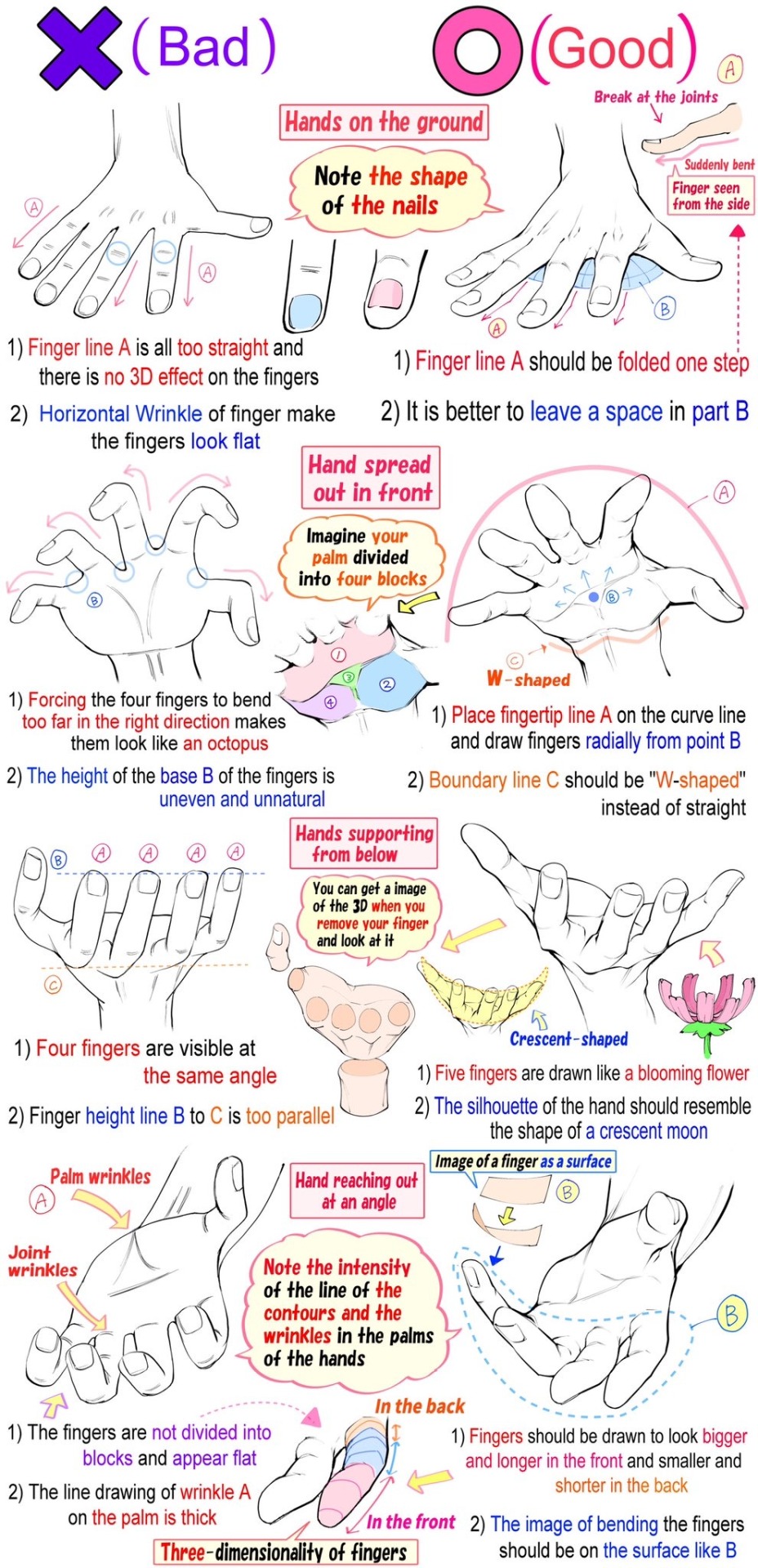
“Drawing techniques for the structure and appearance of the fingers when the hand is extended”
Source: Twitter
Character Movements #1
1. Sighing: The character releases a deep breath, conveying frustration, relief, weariness, or resignation.
2. Shivering: The character's body trembles involuntarily, often indicating fear, coldness, or a strong emotional response.
3. Trembling hands: The character's hands shake noticeably, suggesting nervousness, anxiety, or fear.
4. Clenching fists: The character tightens their hands into fists, expressing anger, determination, or frustration.
5. Biting nails: The character nibbles or bites their nails, indicating nervousness, anxiety, or anticipation.
6. Tapping fingers: The character rhythmically taps their fingers on a surface, suggesting impatience, irritation, or deep thought.
7. Pacing: The character walks back and forth in a small area, indicating restlessness, anxiety, or contemplation.
8. Slumping shoulders: The character's shoulders droop or sag, conveying defeat, sadness, or exhaustion.
9. Tilting head: The character inclines their head to the side, expressing curiosity, attentiveness, or confusion.
10. Rubbing temples: The character massages their temples with their fingertips, suggesting stress, tiredness, or a headache.
What to give a fuck about,while writing your first draft!
I`ve posted a list about things you don´t need to give a fuck about while writing your first draft. Here are things you NEED TO CARE about! (in my opinion)
Your Authentic Voice: Don't let the fear of judgment or comparison stifle your unique voice. I know it´s hard,but try to write from your heart, and don't worry about perfection in the first draft. Let your authenticity shine through your words.
Your Story, Your Way: It's your narrative, your world, and your characters. Don't let external expectations or trends dictate how your story should unfold. Write the story you want to tell.
Progress Over Perfection: Your first draft is not the final product; it's the raw material for your masterpiece. Give a fuck about making progress, not achieving perfection. Embrace imperfections and understand that editing comes later.
Consistency and Routine: Discipline matters. Make a commitment to your writing routine and stick to it.
Feedback and Growth: While it's essential to protect your creative space during the first draft, be open to constructive feedback later on. Giving a f*ck about growth means you're willing to learn from others and improve your work.
Self-Compassion: Mistakes, writer's block, and self-doubt are all part of the process. Give a f*ck about being kind to yourself. Don't beat yourself up if the words don't flow perfectly every time. Keep pushing forward and remember that writing is a journey.
Remember, the first draft is your canvas, your playground. Don't bog yourself down with unnecessary worries.

-
 oldykirby liked this · 1 week ago
oldykirby liked this · 1 week ago -
 ph1losophi liked this · 1 week ago
ph1losophi liked this · 1 week ago -
 slowlypoking liked this · 1 week ago
slowlypoking liked this · 1 week ago -
 greenleafsims liked this · 1 week ago
greenleafsims liked this · 1 week ago -
 tessytempest liked this · 1 week ago
tessytempest liked this · 1 week ago -
 watergals liked this · 1 week ago
watergals liked this · 1 week ago -
 holly192 liked this · 1 week ago
holly192 liked this · 1 week ago -
 vixel-eclipse liked this · 1 week ago
vixel-eclipse liked this · 1 week ago -
 prettyiwa liked this · 1 week ago
prettyiwa liked this · 1 week ago -
 the--seafoamgoddess liked this · 1 week ago
the--seafoamgoddess liked this · 1 week ago -
 books-coffee-rain-cats reblogged this · 1 week ago
books-coffee-rain-cats reblogged this · 1 week ago -
 selfsfret liked this · 1 week ago
selfsfret liked this · 1 week ago -
 straewberries reblogged this · 1 week ago
straewberries reblogged this · 1 week ago -
 nc0210 liked this · 1 week ago
nc0210 liked this · 1 week ago -
 writermuses liked this · 2 weeks ago
writermuses liked this · 2 weeks ago -
 willowsgarden-writingaccount reblogged this · 2 weeks ago
willowsgarden-writingaccount reblogged this · 2 weeks ago -
 ritsuka-is-dawn liked this · 2 weeks ago
ritsuka-is-dawn liked this · 2 weeks ago -
 fadedresovrces reblogged this · 2 weeks ago
fadedresovrces reblogged this · 2 weeks ago -
 sharatheundead liked this · 2 weeks ago
sharatheundead liked this · 2 weeks ago -
 secretbutterfliessea reblogged this · 2 weeks ago
secretbutterfliessea reblogged this · 2 weeks ago -
 pleaseatdove liked this · 2 weeks ago
pleaseatdove liked this · 2 weeks ago -
 everyusernameistakenwtfsstuff liked this · 2 weeks ago
everyusernameistakenwtfsstuff liked this · 2 weeks ago -
 igomeowcattiee liked this · 2 weeks ago
igomeowcattiee liked this · 2 weeks ago -
 savingwritingthings reblogged this · 2 weeks ago
savingwritingthings reblogged this · 2 weeks ago -
 sagblue liked this · 2 weeks ago
sagblue liked this · 2 weeks ago -
 quoinie liked this · 2 weeks ago
quoinie liked this · 2 weeks ago -
 themoonlightsfracturedstars liked this · 2 weeks ago
themoonlightsfracturedstars liked this · 2 weeks ago -
 tumkink liked this · 2 weeks ago
tumkink liked this · 2 weeks ago -
 heartflt reblogged this · 2 weeks ago
heartflt reblogged this · 2 weeks ago -
 purlaquarius liked this · 2 weeks ago
purlaquarius liked this · 2 weeks ago -
 badslittlemuffin liked this · 2 weeks ago
badslittlemuffin liked this · 2 weeks ago -
 quinsenberry-blog liked this · 3 weeks ago
quinsenberry-blog liked this · 3 weeks ago -
 quinsenberry-blog reblogged this · 3 weeks ago
quinsenberry-blog reblogged this · 3 weeks ago -
 rocktavian liked this · 3 weeks ago
rocktavian liked this · 3 weeks ago -
 kisimet liked this · 3 weeks ago
kisimet liked this · 3 weeks ago -
 makiglazer reblogged this · 3 weeks ago
makiglazer reblogged this · 3 weeks ago -
 makiglazer liked this · 3 weeks ago
makiglazer liked this · 3 weeks ago -
 dienamiight reblogged this · 3 weeks ago
dienamiight reblogged this · 3 weeks ago -
 lilithincapricorn liked this · 3 weeks ago
lilithincapricorn liked this · 3 weeks ago -
 dienamiight liked this · 3 weeks ago
dienamiight liked this · 3 weeks ago -
 sn0zzzz liked this · 3 weeks ago
sn0zzzz liked this · 3 weeks ago -
 maiadung liked this · 3 weeks ago
maiadung liked this · 3 weeks ago -
 amogii reblogged this · 3 weeks ago
amogii reblogged this · 3 weeks ago -
 lolimsad09 liked this · 3 weeks ago
lolimsad09 liked this · 3 weeks ago -
 beetlejulesart liked this · 3 weeks ago
beetlejulesart liked this · 3 weeks ago -
 macaroni-cannoli liked this · 3 weeks ago
macaroni-cannoli liked this · 3 weeks ago -
 whateversawesome reblogged this · 3 weeks ago
whateversawesome reblogged this · 3 weeks ago -
 russetfoxfur reblogged this · 3 weeks ago
russetfoxfur reblogged this · 3 weeks ago
